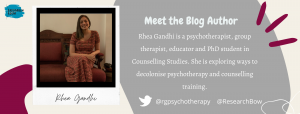Doing our PhD is so much more than just our research. It is a transformation in our way of life. Especially if like me, you have moved abroad to do it. It is a life change – a huge one – and it sometimes feels like a lonely process. Those solitary research moments where we feel stuck, lost, alone and helpless are mirrored as we traverse unfamiliar education, health, and government systems through this transition. Life happens while we do our PhDs and this is a short story about life, helplessness and being held together by the kindness of others. And how much we need it, in those lonely moments at work and otherwise.
“We can only take the patient into the room, you will have to wait outside”. The room felt desolate when I had to wait for the news of my husband’s health alone. We had just moved countries and we only had each other. That usually felt enough. But today, we were separated in our fear, desperate for the comfort of the certainty of the other. The not knowing felt bearable together. But apart, not so much.
I looked around the dreary waiting room. 6 am on a Saturday morning in Scotland. Most people here had been on nights out, got into fights and falls and were reconsidering their inebriated choices – or laughing about them. There was a group of young girls sitting across me, all asleep on one another, one sitting up with her head against the wall. A sweet, loving sight. When one of them got up to check on when she could go in, I saw the blood from her head injury had stained the wall behind her a bright, leaky red. She returned, telling her friends she was supposed to be next. They laughed and joked about waiting here for 4.5 hours, that a bloody head and concussion couldn’t get her in sooner. But in between those laughs, tears welled up. “I am so sorry” I overheard her say. Hugs and words of kindness and reassurance were exchanged.
A family of 6 rushed towards a woman who had emerged out of the ER. She looked shaken and her daughter, maybe 6 years old, ran to hug her mummy. I could feel in my bones the relief on their faces. “It was just a scare”, I heard her say to her children. “Mummy is going to be okay”. Her daughter did not let go of mummy and the group enveloped one another in a giant hug. They stayed that way.
“Are you Rhea? I have an update about your husband. Sit down sweetheart, I’ll tell you all that’s happened so far.” He sat me down and offered me information and profound reassurance. His kind eyes showed through the mask, he sat beside me and ran me through the medications given and tests run. As I write I feel disheartened I will not recognize this gentleman outside the hospital, I did not see his face, just his eyes. But I will remember the relief and depth of empathy they offered me. If you ever read this, thank you.
3 hours later, he lead me into the room where my husband was asleep after taking 3 doses of morphine and IV fluids to ease his pain. “Sorry it took so long to get you in here love, but you’re here now”, he said gently. I saw my resting husband, and everything suddenly felt manageable again. I touched his hand and felt even stronger. Together, we were okay. Alone in crisis, not so much. I asked him if he was scared when he was alone and he nodded sleepily. I felt the same. Just as those people I witnessed outside. But in the ER, the story looked different. Most people here were alone. Not because their loved ones had been asked to stay outside, but also because they arrived alone. They relied on the care in the system and the staff at the NHS caring beyond anything I had witnessed before. They were not just doctors and nurses, they took on the roles of reassuring families for those who didn’t have them at the time. On a busy day at the ER, their compassion stayed unwavering.
As my husband rested, the sounds of the emergency room echoed in my ears. I heard the sounds of a neurological exam; “Do you know where you are? What day it is?”, “Can you puff out for face for me like this?”, “Can you smile for me? That’s great!”, or cardiovascular ones; “Your pulse seems inconsistent, but let me listen into your heart”. I heard the sounds of doctors preparing patients for their last days – “There’s nothing more we can do, your body is shutting down. You might be in pain, and we can help you with that.”. The sounds I heard whirling around the busy NHS ER were really a symphony of love.
In India, where I am from, to imagine a patient alone in the room is unimaginable. In a collectivistic culture like ours, there are almost too many worried friends/family members present. But here, the cultural contrast was stark. It made me realise just how much the NHS staff takes on to create a healing environment – because comfort is not just medicinal. It is tough, being sick. It is even tougher being sick alone. The staff have to deal with aloneness and illness – that’s a humongous task to take on every day at work. And they need much more support and compensation than the system offers.
It’s easy to complain about the NHS, but with my repeated use of their services it is not the people in them, but the system built around them that is problematic. Low wages and long work hours for healthcare workers are an exploitation of the kindest part of human nature as I witnessed in this ER, and we cannot continue to stand for it. The team worked like clockwork together, seamlessly moving from their ‘assigned’ role to a carer, administrator, leader etc. The NHS staff are so much more than their job title. And in their own words, we need to ‘listen into the heart’ of their work and construct systems that support them, instead of letting them crumble under the weight of the exploitative conditions under which they attempt to perform optimally. I don’t want to salute their sacrifice or commend them. It is not our gratitude that is needed, but our empathy to take the same form as theirs does – in action and practice.
As I end this piece, I am reminded of how much containment, encouragement and support we need as PhD students on this isolated voyage through the tides of our research. The warm faces of friends/colleagues at the office, desperate meetings with our supervisors, our loved ones that try very hard to understand what is it that we really do all day – it is this that keeps us trudging along. Whether it is health systems or educational ones, the people in them bring vitality into our lives. I take this last moment to ask you this – whose faces shine through when you read this? And have you thanked them yet?
If you are feeling alone here are some services and organisations, you can contact:
· The School of Health in Social Science Support Team, Email: studentsupport-health@ed.ac.uk
Support offered by the University of Edinburgh:
· The Student Association Advice Place
· Chaplaincy Listening Service
Support offered by external charities:
· Nightline, Tel: 0131 557 4444 (8pm –8am)
· Samaritans, Free call: 116 123, Text message: 07725 90 90 90, Email: jo@samaritans.org
· Breathing Space, Tel: 0800 838587 (Mon –Thu 6pm –2am, Fri –Mon 6pm –6am)
· Mind
· iThrive




How heart rending is this piece of writing!!! Now we understand the complex process of a PhD student even better. A big thankyou to all the students studying psychology: for always listening to our hearts and the immense sensitivity and resilience this profession requires.and thankyou NHS for taking care of them!!
Health is our true wealth and the NHS is the guardian of this wealth! As this article points out this effecient compassionate service should be acknowledged and rewarded adequately!
Truly a heart wrending article! A big thank you to all who support all those doing research, who work endlessly to find new solutions and ways of working in life,very often far away from the comfort of their homes and loved ones!